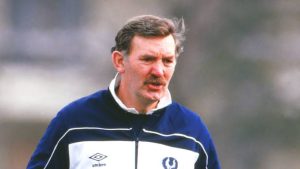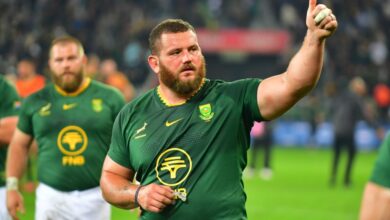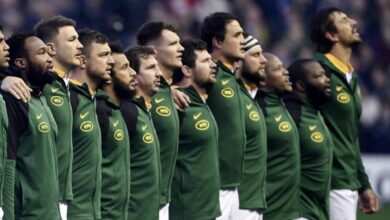Rugby Coach Whose Scotland Team Scored Famous 33-6 Victory Against England

Derrick Grant
Born: April 19, 1938;
Died: November 10, 2024
Derrick Grant, who has died aged 86, was a totemic figure in Scottish rugby who left an indelible mark on the game over many years, firstly as an internationalist, then as national coach, selector and team manager. A deep love of the game for its own sake and a keen appreciation of what it meant to his townsfolk inspired him to scale the heights in a lifelong involvement. Despite his high profile, he never sought the limelight but remained humble and true to his roots.
Among the high points of his playing career were 14 Scottish caps at wing forward between 1965 and ’68 while a particular highlight was the 1966 British and Irish Lions tour of Australia. More Scotland caps would undoubtedly have come his way had he not had to retire in January 1968 on medical advice.
Concussion suffered during a match against Boroughmuir along with a history of concussions led to temporary sight impairment and unavoidable retiral. Adding to his disappointment, he had been verbally assured of a place on the 1968 Lions tour to South Africa, offering the real prospect of a Test place whereas injury on the 1966 tour had restricted his appearances. His 14 caps included a prized win against South Africa.
Derrick also played three times for the Barbarians including against the All Blacks and he featured regularly in a highly successful South of Scotland side which beat the touring Australians and came close to defeating the All Blacks.
As captain of the Greens in 1963/4 he led them to double success in the Unofficial Championship and Border League while also sharing in several other Championship and Border League wins. In 7-a-sides, he won several Borders tournaments and was unlucky not to win Melrose or Middlesex, being defeated finalist three times in the former and once in the latter. An all-action player who never gave opponents any respite, he was an effective tackler and accomplished ball player who played to win.
He soon demonstrated an aptitude for coaching, taking his home town Hawick to an Unofficial Championship before leading them in the Leagues era to five consecutive titles from inception in 1973/4.
Together with Jim Telfer he also coached the South of Scotland, winning several Inter District titles, soon attracting attention from Murrayfield. After a period as assistant national coach he became head coach between 1986 and ’88 with his Scotland team recording a famous 33-6 victory over England in 1986.
A year later he led Scotland to the inaugural World Cup in New Zealand where they lost in the quarter finals to their hosts, the eventual winners. Derrick introduced new young players whose names would soon resonate, including the Hastings brothers, David Sole and Finlay Calder who shone in the 1990 Grand Slam when he was a specialist forwards coach. As part of the national coaching group he continued making an important contribution, also serving as a selector and team manager.
A demanding taskmaster, he thought deeply about the game with his guiding principles being quick ball, ball retention and decision making on when forwards kept the ball or involved the backs. Initially he was much influenced in his approach by fellow Teri, the great Hugh McLeod, with his knowledge his knowledge derived from two 1950s Lions tours.
Derrick Grant was born in Hawick into a rugby family, the youngest son of Tom, a hosiery worker and Vi, his older brothers being Jack and Oliver. Father Tom had played occasionally for the Greens while Jack was a regular team member and played a national trial. Brother Oliver was also a fixture in the XV in the back row playing alongside Derrick, winning six caps between 1960 and ’64.
Derrick attended Hawick High School at both primary and secondary where his rugby potential saw him selected for under-15 South of Scotland Schools in the annual match against their Welsh counterparts, days before starting work in Hawick as a frameworker with Braemar knitwear which later became Pringle’s. After some 49 years during which he became a manager, he retired from the company.
Derrick began playing regularly for junior side Hawick Trades aged 15 and later that season was selected by the Greens to play against London Scottish, recalling, “I was a boy against men!” National service followed in the Tank Corps in Catterick and Germany after which in 1958 he established himself in the Hawick team for the next ten years.
Meanwhile. at the town’s Crown Hotel he had met future wife Elsie whom he married in August 1961, going on to enjoy a long, happy marriage during which they had sons David and Steven.
After a storied playing and coaching career at the highest level, in 2013 at a special Hawick club function, Derrick was honoured with selection as a member of The Greatest Ever Greens Team, culled from their near 140-year history and further recognised with appointment as coach of that legendary team.
In an interview, he stated that “my ambition was always to play for Hawick and ultimately I achieved that honour”, adding, “it was all about winning”. On coaching he recalled the 1966 Lions Tour as the greatest experience of his life and that he was determined to learn to bring things back to Hawick, with a grin commenting, “I maybe pushed the boys harder than they were used to…”
Derrick is survived by his wife, sons and grandchildren Blair, Mackenzie, Laura and Emily.
JACK DAVIDSON
At The Herald, we carry obituaries of notable people from the worlds of business, politics, arts and sport but sometimes we miss people who have led extraordinary lives. That’s where you come in. If you know someone who deserves an obituary, please consider telling us about their lives. Contact garry.scott@heraldandtimes.co.uk



